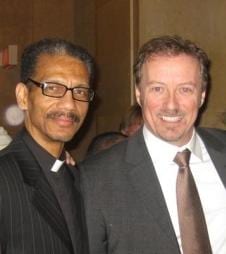The first media interview Rev Darryl Gray did when he arrived in Montreal in 1998 was with me, after he was hired as minister of Montreal’s historic black church, Union United in Little Burgundy. Gray was a rising star in Montreal and had a big mouth like his role models Dr Martin Luther King Jr and Malcolm X.
Meanwhile, my family had just turned their backs against the Catholic Church. “If there is no room for our [gay] son in your church,” Mom told a priest at St-Leon’s of Westmount, “then there is no room for your church in our home.”
So I attended my first-ever service at Union United with my younger brother Skye and our parents on Easter Sunday 12 years ago. Back at my folks’ home after the service, my Mom — whose Creole political family was forced into exile by the British from the southern African island nation of Mauritius almost 35 years earlier — poured herself a scotch and said, “There were five white people in that church and three of them were my family!”
It was a special day for my mother, sealed by Union’s spectacular history.
Founded by black railway porters and their wives in 1907, Union has been a beacon in Montreal’s black community for generations. Everybody from Canada’s first black Governor General, Michaëlle Jean, to basketball hero Trevor Williams grew up in Little Burgundy, and Union was also home to the city’s famed Montreal Jubilation Gospel Choir, as well as jazz legends Oscar Peterson and Oliver Jones.
To boot, both Nelson Mandela and Desmond Tutu have spoken from Union’s wooden pulpit, and it was here at Union that Gray — whose own father worked alongside Dr Martin Luther King during America’s black civil rights movement — founded Montreal’s Martin Luther King Jr Legacy Committee some 10 years ago.
Every year the committee gives awards to Montrealers who best personify the life and message of Dr King, and last November Gray — who founded Montreal’s Imani Family & Gospel Church in 2005 — asked me to submit a nominee.
I chose Montreal social worker and McGill professor Bill Ryan, who in 1991 founded Project 10, the city’s historic, groundbreaking support group for queer teens struggling with suicide, bullying and homophobia at home and school.
Then Ryan — whose partner is Haitian-Canadian Steve Bastien — expanded the concept nationally, founding Canada’s Safe Spaces movement with sites in Halifax, Moncton, Kamloops and other cities across the country. In 1992 he was the founding president of the board of directors of Montreal’s Séro-Zéro, an HIV-prevention group for gay men. And Ryan was also founding co-chair of the Canadian Rainbow Health Coalition.
To my delight — and, I admit, surprise — Ryan was chosen as one of this year’s recipients of the Martin Luther King Jr Legacy Awards and was greeted at Montreal City Hall this past January by both Gray and Montreal Mayor Gerald Tremblay.
I made sure I was there too because this was the first time a gay man was being so honoured in Montreal.
Tellingly, Gray told me afterwards, “Of all the nominations, that was the one. That was the nomination that sparked a lot of debate.”
That this happened among the leaders of various prominent religious denominations from across multicultural Montreal is a healthy thing for both gay and straight people.
“I was quite honoured to be associated with Martin Luther King,” Ryan told his Moncton, New Brunswick, hometown newspaper the Times & Transcript. “I was thrilled to receive the recognition and to have my name involved with all kinds of people whom I admire and whose works I had admired. To have one’s work associated with Martin Luther King’s movement and ideology is quite thrilling and quite humbling.”
Ryan will continue spreading his message at the Rainbow Health Ontario 2010 Conference in Toronto this week, on various panels but notably as a speaker at the March 26 morning plenary, Learning from Other Regions. Ryan will speak about the Montreal experience and what the rest of Canada can learn from it.
“Basically, what happened in Quebec in the 1960s — civil rights, women’s rights, gay liberation — happened all over the West,” Ryan explains, “but in Quebec there was also the implosion of the Catholic Church, and Quebec had the Quiet Revolution. There was a profound revision of basic beliefs and moral stances and the Church’s view of homosexualty was thrown out.”
Despite Quebec society’s progressive attitude towards homosexuality — in 1977, it became just the second jurisdiction in the world after the Netherlands to outlaw discrimination based on homosexuality — institutional and systemic homophobia remained. Ryan says there is still much work to be done, especially since an action committee was never struck up to advance the recommendations of Quebec’s 1993 public hearings on violence against gay people.
Also, outside HIV, Montreal and Quebec’s gay-community services remain poorly funded, up to the discretionary powers of individual ministers and Quebec MNAs.
For instance, back in 1998, after Montreal’s now-defunct anti-gay-bashing support service Dire Enfin la Violence (DELV) ran out of cash, and then-closeted PQ minister André Boisclair reneged on a promise to cut them a fat government cheque, I outed Boisclair in Montreal’s Hour magazine. Boisclair then quickly sent DELV a cheque for several thousand dollars.
But government funding is still extremely tight. Even Montreal’s two most famous gay festivals, Black & Blue and Divers/Cité, saw their federal funding slashed by $100,000 and $150,000 respectively last year.
“CLSCs [neighbourhood clinics] should be providing services to gay youth across the province, not just in Montreal’s Gay Village,” Ryan says. “That’s why we need someone to be in charge overall. We need the equivalent of the Status of Women Bureau. We need someone to push ministries to adapt our services. And I think we’ll get it. If you look back at our trajectory over the last two decades, clearly it’s just a matter of time.”
Thanks to the pioneering work of local and national heroes like Bill Ryan.
Bill Ryan will speak at the Rainbow Health Ontario 2010 Conference in Toronto, March 24-26. Check out rainbowhealthontario.ca/conference/welcome.cfm.
Project 10 has moved in with the MUCS (Montreal Urbain Community Sustainment Project) in Montreal’s NDG neighbourhood (2000 Northcliffe, #218). Call 514-989-4585 or visit www.p10.qc.ca.
Moise’s Apples is Richard Burnett’s monthly Xtra.ca column on the history of gay Montreal. Burnett is also Editor-at-Large of Montreal’s Hour magazine, where he writes his national queer-issues column, Three Dollar Bill.


 Why you can trust Xtra
Why you can trust Xtra


